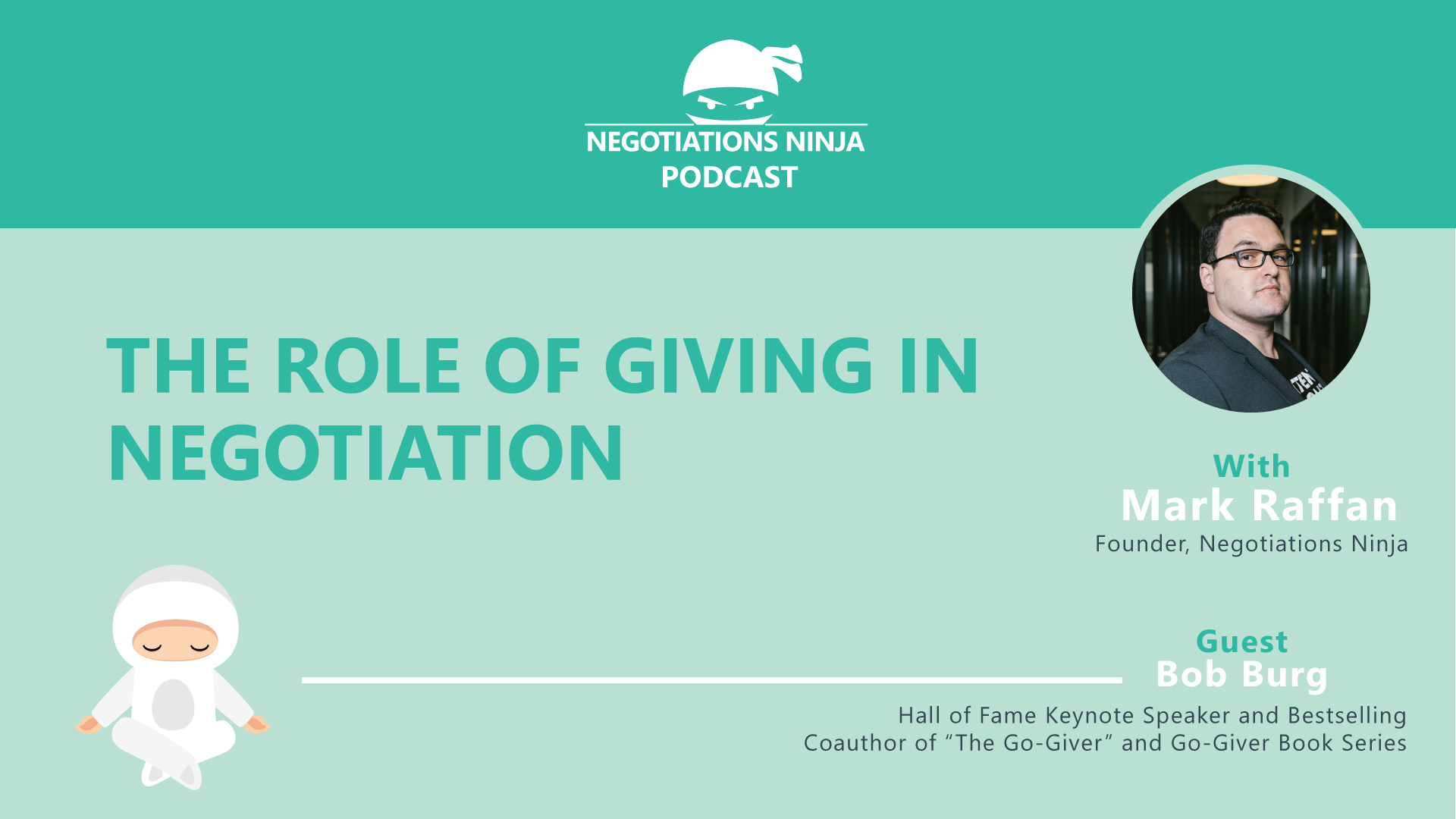Bob Burg would define giving as “Being focused on providing immense value to others.” Doing so is a more pleasant way of living life and conducting business—and the most financially profitable. But does giving truly have a place in the negotiation process? Can it help you reach your objectives? Listen to this episode of Negotiations Ninja to hear Bob’s thoughts.
Bob Burg has been writing and speaking for 30 years on the topics of sales, marketing, communication, and persuasion skills. He co-wrote a series called “Go-Getter” with John David Mann about the power of giving.
- [2:19] Is the concept of giving naive?
- [8:16] Think strategically about giving
- [12:08] Value is in the eye of the beholder
- [14:27] The constructs of happiness and pleasure
- [18:40] Detachment from the outcome
- [23:40] How to change perceived value
- [26:58] Learn more about Bob Burg
Is the concept of giving naive?
Bob believes that you want to give value without attachment to the result. It comes down to understanding human nature. One of the things Bob says to sales audiences is that no one will buy from you because you have a quota to meet. They won’t buy from you because you need the money or because you’re a nice person. They buy from you because they believe they will be better off by doing so than by not doing so. But the value you give to someone else doesn’t need to cost you. Bob notes that what you want to do is give in a way that both parties come away significantly better off than they were before.
Compromise shouldn’t be the end result
Bob shares an illustration about two kids fighting over an orange. Both complained to their dad that one needed the orange more than the other. So the father split the orange in two. They compromised, and neither of them was happy.
When you compromise, nobody actually gets what they want, and they’re miserable aftward. You’re giving something up that you want to get a certain result. It’s sometimes necessary—but it shouldn’t be the first goal. The first goal should be collaboration. You give something without it costing you that helps the other person while helping you.
The dad should’ve asked why each kid wanted the orange. He would’ve found out that one child wanted to eat it. The other wanted to use the peel for a science experiment. Had they determined why each of them wanted the orange in the first place—instead of splitting it down the middle—they could’ve come to an agreement where they were both happy.
You have to find out as much as you can about what the other side wants. Then you come from a position of strength. You come to the table prepared. You know what’s of value that you can give to them while not giving up what you truly want.
Strategic giving
Bob believes you should always think about giving strategically. Never ask a question you don’t know the answer to whenever possible. He’s a big believer in taking that concept and implementing it into flow charts. When you’re planning your questions and conversation, you should think about what the different things may come up.
If you ask a question, you can map out all the potential answers, craft what you would ask next, and continue the process. It not only helps you plan your responses but helps you think through where they might be. The more work you do beforehand, the more prepared you are and the easier it’s going to be to get the results you want.
How does perceived value play into the conversation? What about the role of happiness? Bob dives deeper into these topics in this episode of Negotiations Ninja. Don’t miss it!
Resources & People Mentioned
- Handbook to Higher Consciousness by Ken Keyes Jr.
- Influence: The Psychology of Persuasion by Robert Cialdini
- How to Win Friends & Influence People by Dale Carnegie
Connect with Bob Burg
Connect With Mark
- Follow Negotiations Ninja on Twitter: @NegotiationPod
- Connect with Mark on LinkedIn
- Follow Negotiations Ninja on LinkedIn
- Connect on Instagram: @NegotiationPod




